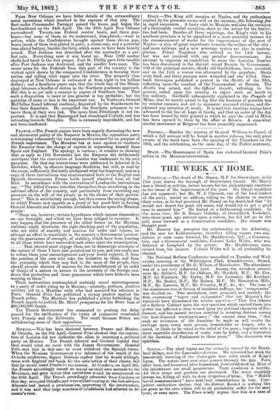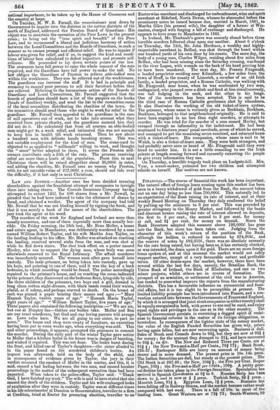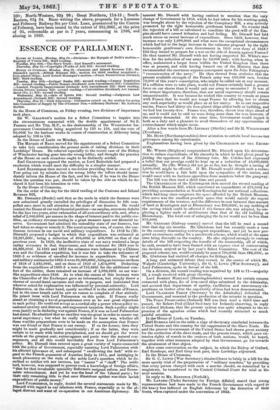THE WEEK AT HOME.
POLITICAL—The death of Mr. Slauey, M.P. for Shrewsbury, in his 71st year, leaves the borough of Shrewsbury vacant. Mr. Sauey was a liberal in politics, better known for his philanthropic exertions in the cause of the improvement of the poor. No liberal candidate has yet appeared; but Mr. W. J. Clement, one of the local leaders of the party, issued an address, calling on the electors to reserve their votes, as he had promised Mr. Slaney on his death-bed that "he would not desert the good old cause, and would try to get a good man to succeed him." He hinted at a forthcoming candidate. In the mean time, Mr. R. Banner Oakeley, of Oswaldkirk, Yorkshire, who three years ago entered upon a canvas, but did not go to the poll, came forward as a Conservative candidate. His chance was thought poor.
Mr. Bristow has accepted the solicitorship to the Admiralty, and the seat for Kiddernimeter, therefore falling vacant, two can- didates at once came forward, Mr. Hucldle,stone, Q.C., a Conserva- tive, and a Government candidate, Colonel Luke. White, who was defeated at Longford by the priests. Mr. Huddlestone since retired from the contest. Colonel White will in all probability be elected. '
The National Reform Conference assembled on Tuesday and Wed- nesday morning at the Whittington Chili, Arundel-street, Strand, under the presidency of Mr. G. Wilson, of Manchester. The attendance was of a not very influential kind. Among the members present were Mr. Hibbert, M.P. for Oldham, Mr. Hatfield, M.P., Mr. Cox, M.P. for Finsbury, Mr. Taylor, M.P. for Leicester, Mr. Kershaw, M.P., Mr. Bazley, M.P., Aft. Baines, M.P., Mr. Remington Mills, M.P., Mr. Lawson, M.P., Mr. Crossley, M.P., &c., &c. The tone of the conference was in favour of manhood suffrage, but "compromise" was decided on. Two resolutions were proposed and carried ; the first, expressing "regret and indignation" that her Majesty's Go- venunent have abandoned the reform question—" That this silence of a Reform Cabinet upon the very question which carried them into
gower has inflicted a deep wound upon the political character of Par- ament, and has caused serious mischief in creating distrust among the best-disposed working-classes :" the second runs thus, "that such an extension of the franchise be made as will confer the suffrage upon every male person, householder or lodger, who is rated, or liable to be rated to the relief of the poor ; together with a more equitable distribution of seats, vote by ballot, and a limitation of the duration of Parliament to three years." The discussion was spiritless.
SOCIAL—The chief topics are the calamity caused by the Marsh- land deluge, and the Lancashire distress. We recorded last week the lamentable bursting of the sluice-gate four miles south of King's Lynn. The waters have ever since poured through the gap. Farm after farm, and homstead after homestead, were swallowed up. Most of the inhabitants are small proprietors. Their condition is terrible. All their crops and produce are destroyed. The water stealthily creeps on, killing all with it-s deep irrigation of brine. The "Middle Level commissioners" have held their consultations in vain. Com- petent authorities declare that the district flooded is nothing like so great as the area whieh will in all probability suffer for the next year, or even more. The Times wisely argues that this is a ease of
national importance, to be taken up by the House of Commons and the country at
On Tuesday, M. W. B. Farnall, the commissioner sent down by Government to inquire into the distress in the cotton districts of the north of England, addressed the Preston Board of Guardians : His object was to ascertain the operation of the Poor Laws in the present crisis; to bring out the true spirit and breadth" of the Poor Law, and to recommend' a liberal and judicious harmony of action between the Local Committees and the Boards of Guardians, in such a manner as to ensure prompt and efficient relief. He was to inquire if labour was given for relief, and if so, to suggest the kind and condi- tions of labour best calculated to defeat imposture and promote self- reliance. He proceeded to lay down certain points of the law. The overseers have full power to raise the whole ameunt of the rate required, and the Guardians have full power to make the call. No law obliges the Guardians of Preston to relieve abk-bodied men within the workhouse. They can be relieved out of the workhouses. The guardians can increase the. staff. It is bad in principle and economy to compel poor ,persons to sell their furniture before they are relieved. Referring to the harmonious action of the Boards of Guardians and Local Committees, Mr. Farnall suggested that the boards of guardians should have a list of the paupers on the books (heads of families) weekly, and send the list to the committee-room of the local committee distributing the charities of the town. So the committee should send those who ought to work for relief to the guardians. Mr. Farnall then appealed to the guardians in the case of mill operatives out of work, not to take into account what they received from private charity, and the guardians assured him they did not do it. He calculated that from all sources an able-bodied man might get 4s. a week relief, and intimated this was not enough to keep him in health till work returned. Then he saw about a hundred men with delicate hands breaking stones. This was not suitable employment for the kind of men. The stone-yard he objected to as applied to " millhands" willing to work, and thought the "moor" better adapted to them, It seems the Preston mill- owners contribute only a fifth of the rate. The _persons receiving relief are more than a tenth of the population. From this to next Christmas there will be raised altogether about 30,000/. in rates, and adding the charities, Mr. Farnall sees no reason why Preston, with its net rateable value of 217,000/. a year, should not tide over the difficulty, if it last only to next Christmas.
Lew AND JUSTICE.—Another case has been decided securing shareholders against the fraudulent attempt of companies to inveigle
them into taking shares. The Consols Insurance Company having attempted to extort 1251. 'for 500 shares from a Mr. Newell, he pleaded that he had been induced to take the allotment of shares by fraud, and obtained a verdict. The agent of the company had told Mr. Newall that he was not binding himself by signing the .book, and 'that it was merely a book of the names of the shareholders. The jury took the agent at his word. The murders of the week for .England and Ireland are more than usually numerous, and one of them especially more than usually hor- rible. On Friday morning, the 16th inst., Mr. Evan Meller, a house and estate agent, in Manchester, was deliberately murdered by a man named William Robert Taylor, and his wife Martha Ann Taylor, on the landing leading to his office. Mr. Meller was attacked on reaching the landing, received several stabs from the man, and was shot at while he fled down stairs. The shot took effect on a porter named Hooley, who ran to support the dying man, whose body was soon afterwards removed to the Royal Infirmary. The actual murderer was immediately secured. The woman soon after gave herself into custody. The male prisoner, on being taken into custody, gave up his keys, and pointing to one of them said it was the key of a back bedroom, in which something would be found. The police accordingly repaired to the prisoner's house, and on reaching the room indicated bythe prisoner, they discovered on thebedroom floor, lying side by side, the three children of the prisoners, two boys and a girl, dressed in long clean cotton night-dresses, with black bands round their waists, placid, as if asleep, and perhaps starved to death. On the breast of each was pinned a paper bearing their names and ages :—" Mary Hannah Taylor, twelve years of age." "Hannah Maria Taylor, eight years of age." "William Robert Taylor, five years of age." These papers also contained the following inscription :—" We are six, but one at Harptry lies—thither our bodies lake. Meller and Son are our cruel murderers, but God and our loving parents will avenge us. Love rules here. We are all going to our sister, to part no more." The house and shop were empty of furniture, an execution having been put in some weeks ago, when everything was sold. This and other proceedings, it appears, prompted the prisoners to commit the murder. During the early part of the winter Taylor gave notice to Meller that a kitchen boiler in his house was in danger of bursting, and wished it repaired. This was not done. The boiler burst daring the frost, and killed one of Taylor's daughters—the sister alluded to in the paper found on the murdered children's bodies. An inquest was afterwards held on the body of the child, and in consequence of evidence given by Taylor, the jury in their verdict censured the conduct of Meller in the matter, and this it is said, caused a bad feeling between the two men, and caused harsher proceedings in the matter of the subsequent execution than had been expected. When taken to the police-office, Taylor said : "Thank God, I have finished my work." The wife is said to have stated that she caused the death of the children. Taylor and his wife exchanged looks of exultation after they were in custody. Taylor was at different times in his life schoolmaster at Dunston in Somersetshire, traveller to a firm at Crediton, .tried at Exeter for procuring abortion, traveller to an Exeterwine merchant and discharged for embezzlement, wine and spirit merchant at Bideford, North Devon, whence he absconded before the promissory notes he issued became due, married in March, 1861, to Martha Giles (his present wife), the daughter of a farmer at Win- canton, charged with forging a bill of exchange and discharged. He appears to have come to Manchester in 1861.
In Ireland, Mr. Thiehault's grave was scarcely closed before three horrible murders followed close upon one another. About 6 o'clock on Thursday, the 15th, Mr. John Herdman, a wealthy and highly_ respectable merchant in Belfast, was shot through the heart within one hundred yards of his own door by his cousin. The same day, the body of a young man, Charles Wilgar, residing about five miles from Belfast, who al been missing since the Saturday evening, was found in the river Lagan, with wounds on the back of his head proving him to have been murdered. The next day, Mr. Francis Fitzgerald, a landed proprietor residing near Kilmalloek, a few miles from the town of Braff in the county of Limerick, a member of an old Irish family, a landed proprietor, and a Roman Catholic, was walking with Mr. Fitzgerald, near home, when he was confronted by two men, undisguised, who jumped over a ditch and fired at him simultaneously, one ball lodging in the neck, and the other in his lungs. One of the murderers has been arrested. This is said to be the third case of Roman Catholic gentlemen shot by ribandmen. It also illustrates the working of the old ticket-of-leave system. The prisoner, whose name is variously given as Beckhain, Beckham Beek-ham, belonged to that neighbourhood originally. He is said di have been engaged in no less than eight murders, or attempts to murder. He was tried for the murder of a man named Hurley, but escaped through an informality in the indictment. He had been sentenced to fourteen years' penal servitude, seven of which he served, and managed to get the remaining seven remitted, and returned home with a ticket-of-leave. His companion, whose name is said to be Walsh, is also a ticket-of-leave man. They were both strangers, and had probably never seen or heard of Mr. Fitzgerald until they were hired to murder him. It is not. a little consoling to see the Irish priests at length coming forward and earnestly exhorting the people to give every information they can.
On Thursday, a horrible tragedy took place on Ludgate-hill. Mrs. Vyse, a corset-maker, poisoned her two children and attempted suicide on herself. Her motives are not known.
Frxexcrec.—The course of financial this week has been important. The natural effect of forei„,un loans coming upon this market has been seen in a heavy withdrawal of gold from the Bank, the amount taken out on one day being no less than 700,000/. This naturally led to an expectation of the Bankraising, its rate of interest, and at their weekly Board Meeting on Thursday they duly confirmed the belief by putting up the minimum to 3 per cent. This was preceded by greater stringency in the Money Market, and followed by the banks and discount houses raising the rate of interest allowed on deposits, the first to 2 per cent., the second to 2 per cent, for money at call, and 24 per cent, for money on deposit. Since the Bank Directors adopted this measure above 126,000/. has gone into the Bank, but more has been taken out. Judging from the character of this week's return of the position of the Bank, although the bullion is reduced in amount by 574,2031., and the reserve of notes by 592,210/., there was no absolute necessity for the rate being raised but having been so, it has certainly checked, as was intended, the drain upon it for gold. There are no more foreign loans spoken of, and at this moment the market would not safely support another, except of a very favourable nature and profitable terms. Of other drams upon the market, however, there have been several within the last few days, namely, the Brazilian Bank, the Union Bank of Ireland, the Bank of Hiudostan, and one or two minor projects, whilst others are in coarse of formation. The prospect of an armistice, or settlement of the civil war in America, has tended to somewhat improve the reports from the manufacturing districts. This has a favourable influence on commercial and finan- cial affairs, but it is too slight to be perceptible at present. The limited liability principle has been introduced into France, and a con- vention entered into between the Governments of France and England, by which it is arranged that joint stock companies in either country shall be equally recognized in both, with power to sue and be sued, and enjoy equal rights and privileges in the one as in the other country. The Spanish Government persists in exercising a dogged spirit of resist- ance to financial reforms in the matter ot its foreign obligations, as heretofore. In consequence of the tighter state of the money market, the value of the English Funded Securities has given way,. prices having again fallen, but are now recovering again. Business is dull. Sales of Stock sent Consols down to 93k, but they are now at 934 for money; for the account they drooped to 914, and have recovered to 9244, ex div. The New and Reduced Three per Cents. are at 914 ; the New Two-and-a-Half per Cents., 764 774; Bank Stock, 235-37; Exchequer Bills are heavy on account of money being dearer and in more demand. The present price is 10a. 14s. prem. The Indian Securities are dull, but steady at the present prices. The Old Stock is at 227-28; the New, 10944; the Five per Cent. Rupee Paper, 1034; the Five-and-a-Half per Cents., 1094. A pretty gene- ral decline has taken place in the Foreign Securities. Speculation has revived in Spanish Certificates at 84 to 9. Russian Scrip has keen down to 4, and is now at 44 prem. Turkish Scrip, 21 4 prem. ; Moorish Loan, 914 4. Egyptian Loan, 14 4 prem. Business has been falling off in Railway Shares, and the market become rather weak compared with last week. There is a fall of 10s. in most of the leading lines. Great Western are at 724 73; South-Western, 99
100; North-Western, 93f 96; Great Northern, 114-15; South- Eastern, 83k 84. Since 'writing the above, proposals for a Lusatme anti Fribourg Railway Six per Cent. Loan, guaranteed by the Canton of Fribourg, have been issued to the extent of 285,0001., at the price of 95, redeemable at par in 7 years, commencing in 1866, and closing in 1869.
































 Previous page
Previous page